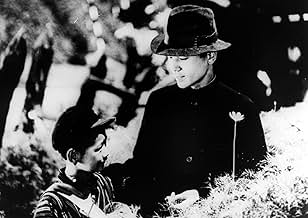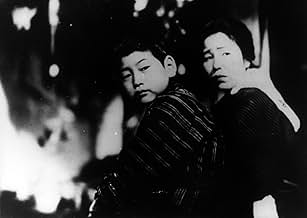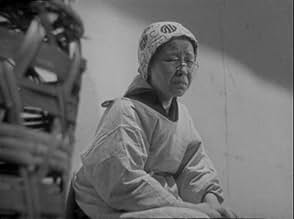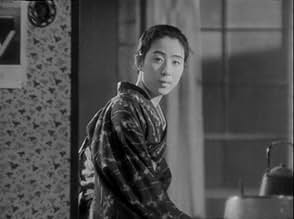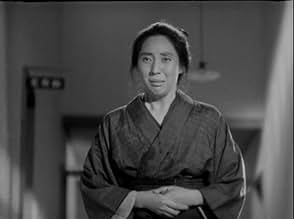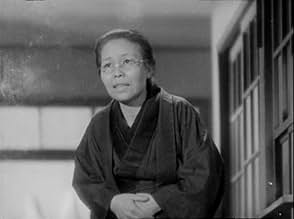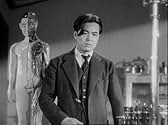IMDb रेटिंग
7.7/10
4.3 हज़ार
आपकी रेटिंग
अपनी भाषा में प्लॉट जोड़ेंA widow sends her only son away to receive a better education. Years later, she visits him, finding him a poor school teacher with a wife and son.A widow sends her only son away to receive a better education. Years later, she visits him, finding him a poor school teacher with a wife and son.A widow sends her only son away to receive a better education. Years later, she visits him, finding him a poor school teacher with a wife and son.
- निर्देशक
- लेखक
- स्टार
Jun Yokoyama
- Okubo's son
- (as Bakudan Kozô)
Tomio Aoki
- Tomibo
- (as Tokkan Kozô)
Seiichi Katô
- Kinjo no ko
- (as Seiichi Kato)
फ़ीचर्ड समीक्षाएं
"The Only Son" is Ozu's first "talkie" - and utilizes sounds/dialogue in a stylistic manner to tell a simple story. The beautiful simplicity that pervades the piece is classical Ozu, and amplifies the poignant tale of a mother coming back to visit her son, after sacrificing her livelihood to ensure he achieves higher education. When she realizes that he is unsatisfied with his life as a night-school teacher, a general melancholic tone begins to unfold through the progression of the narrative.
There are some fine indoor shots of the house where the son lives, and also, some greatly composed scenes of the run-down industrial neighborhood where the son goes out to buy "noodles" from a nearby stand. What's also memorable about the film is its excellent rendition of outdoor nature shots, one scene stands out in my mind where the son is having a discussion with his mother. There is also a great shot of the night-school teacher looking out dismal and lonely from the school-building to a city sign, which is juxtaposed against a dark, night sky.
The ending is nicely done, and overall, the film is crafted in that spare, simple perfection that is the stylistic hallmark of Ozu's cinema.
There are some fine indoor shots of the house where the son lives, and also, some greatly composed scenes of the run-down industrial neighborhood where the son goes out to buy "noodles" from a nearby stand. What's also memorable about the film is its excellent rendition of outdoor nature shots, one scene stands out in my mind where the son is having a discussion with his mother. There is also a great shot of the night-school teacher looking out dismal and lonely from the school-building to a city sign, which is juxtaposed against a dark, night sky.
The ending is nicely done, and overall, the film is crafted in that spare, simple perfection that is the stylistic hallmark of Ozu's cinema.
Of all the major directors in the world, Ozu was the last one to convert to sound; "The Only Son" was his first "all-talkie" film (in 1936), and it is remarkably inventive (technically) as well as deeply moving. Once again, his film deals with family dynamics: in this case, a widowed mother who has worked selflessly to provide her son with an education. But when she goes to visit him, she finds that he has not fulfilled his promise: he's stuck in a mediocre job, he has a wife and child and can't make any drastic changes because of his responsibilities. The ways that the mother and son try to reach an understanding, and their mutual resignation to the disappointments of life, create a glancing but powerful sense of that "quiet desperation" which was so often Ozu's theme.
This is a nice piece of work from early Japanese cinema that's worth checking out for all fans of this period's films.
The plot is simple, nothing really special if you ask me, but Ozu sure knew how to handle this kind of simple stories he portrayed in all his films. It's a slow-paced film, which adds a more natural feeling to it in my opinion, full of powerful and emotional images supported by a really splendid and natural acting (as usual in Ozu's films).
Ozu really stands out from many other directors, he had the ability to portray life on screen and here you can definitely see it.
At first this kind of filmmaking didn't do much for me, but it has really grown on me with time. It surely is not for everyone; Ozu is just different cinema.
My score: 8.5/10
The plot is simple, nothing really special if you ask me, but Ozu sure knew how to handle this kind of simple stories he portrayed in all his films. It's a slow-paced film, which adds a more natural feeling to it in my opinion, full of powerful and emotional images supported by a really splendid and natural acting (as usual in Ozu's films).
Ozu really stands out from many other directors, he had the ability to portray life on screen and here you can definitely see it.
At first this kind of filmmaking didn't do much for me, but it has really grown on me with time. It surely is not for everyone; Ozu is just different cinema.
My score: 8.5/10
10soren19b
It is a shame that this film is not available for wider viewing. I had the opportunity of seeing it at an Ozu retrospective in Cleveland. This film measures up to the other great classic Ozu films. The impact of Ozu's films works in much the same way as Japanese painting. There is great power in its open spaces and silences. They lend greater power to the words and emotions that are expressed. The dignity of the characters as they struggle with life is moving. Ozu is a master
of world cinema because he deals with themes of universal import and he does so with impeccable style. Especially noteworthy in this film is his effective use of music and sound. All in all, a very worthwhile experience
of world cinema because he deals with themes of universal import and he does so with impeccable style. Especially noteworthy in this film is his effective use of music and sound. All in all, a very worthwhile experience
In 1923, in the province of Shinshu, the widow and simple worker of a silk factory Tsune Nonomiya (O-Tsune) decides to send her only son to Tokyo for having a better education. Thirteen years later, she visits her son Ryosuke Nonomiya (Shinichi Himori), and finds that he is a poor and frustrated night-school teacher with a wife, Sugiko (Yoshiko Tsubouchi), and a baby boy.
"Hitori Musuko" is a poignant, heartbreaking, sensitive and beautiful movie about expectations, frustrations, revelations and hope in life. Once again the major concern of Ozu is with the family and human relationship. In "Hitori Musuko", Ozu brilliantly uses the sound, recent in 1936, in the end of the simple but touching story, when the machines in the factory stop working symbolizing the death of Tsune. I saw this movie in a Brazilian cable television in a copy that certainly needs restoration, and I regret to inform that only "Ohayô" has been released on DVD in Brazil. Only in festivals, and occasionally in cable television, Brazilians have the chance to see the work of this great director. Seeing the number of votes of this masterpiece in IMDb (only 88 votes), I believe that the distribution problem of this film might be international. My vote is ten.
Title (Brazil): "Filho Único" ("Only Son")
"Hitori Musuko" is a poignant, heartbreaking, sensitive and beautiful movie about expectations, frustrations, revelations and hope in life. Once again the major concern of Ozu is with the family and human relationship. In "Hitori Musuko", Ozu brilliantly uses the sound, recent in 1936, in the end of the simple but touching story, when the machines in the factory stop working symbolizing the death of Tsune. I saw this movie in a Brazilian cable television in a copy that certainly needs restoration, and I regret to inform that only "Ohayô" has been released on DVD in Brazil. Only in festivals, and occasionally in cable television, Brazilians have the chance to see the work of this great director. Seeing the number of votes of this masterpiece in IMDb (only 88 votes), I believe that the distribution problem of this film might be international. My vote is ten.
Title (Brazil): "Filho Único" ("Only Son")
क्या आपको पता है
- ट्रिवियाThis was Yasujirô Ozu's first feature film with all-synchronous dialogue.
- कनेक्शनFeatured in A Train Arrives at the Station (2016)
- साउंडट्रैकOld Black Joe
Written by Stephen Foster
टॉप पसंद
रेटिंग देने के लिए साइन-इन करें और वैयक्तिकृत सुझावों के लिए वॉचलिस्ट करें
- How long is The Only Son?Alexa द्वारा संचालित
विवरण
- रिलीज़ की तारीख़
- कंट्री ऑफ़ ओरिजिन
- भाषाएं
- इस रूप में भी जाना जाता है
- The Only Son
- उत्पादन कंपनी
- IMDbPro पर और कंपनी क्रेडिट देखें
- चलने की अवधि1 घंटा 22 मिनट
- रंग
- ध्वनि मिश्रण
- पक्ष अनुपात
- 1.37 : 1
इस पेज में योगदान दें
किसी बदलाव का सुझाव दें या अनुपलब्ध कॉन्टेंट जोड़ें


